What are the best fruit trees for an organic person?
Due to my past dealings with cancer, I only eat organic. I want to try my hand at fruit trees. I am thinking of apples, pears or peaches. Which of these is easiest to grow organically? I am having trouble finding this information.
Thank you.
Comments (47)
warrenl
16 years agoNot sure of peaches.
Depending upon where you live, pears may not need any spray whatsoever if you get one resistant to scab and fireblight. I can get quite acceptable fruit from Seckel with no sprays. Most pears require a pollinator, including those catalogs say they are self-fertile (It may be self-compatible but you will get much less fruit).
Apples generally take a lot of work to grow conventionally, organically more so. Even the most disease resistant apples still get bugs, though there are exceptions. For example, Purdue, Rutgers, and U. of Illinois have bred many apples resistant to disease and bugs, but they will never release them because they aren't commercially acceptable, for whatever reason, including short shelfspans. One of many cases in point: PRI 1569-1 is an apple that is resistant to Scab, Fireblight, Apple Maggots, and Codling Moths. Aromatic flavor is similiar to Jonagold. But they won't officially release it. People can get scions from USDA/ARS, but you won't find it in a nursery. Oh well, such is life.
Here is a link that might be useful: {{gwi:59930}}
alan haigh
16 years agoEarly peaches and Japanese plums often escape plum curculio damage. With stonefruit a key issue may be brown rot and the earlier ripening fruit gets exposed to fewer warm humid days. If you grow the peaches in a relatively weed free area where the mulched bases of the trees meet a clean turf you'll have fewer problems with stinkbugs and tarnished plant bugs which are probably an issue where you are.
If you use Surround you have an opportunity to get some decent apples I think, but it will require 3 or 4 timely applications. Surround will help protect your other fruit as well.
Related Professionals
Edmond Landscape Architects & Landscape Designers · Lyons Landscape Architects & Landscape Designers · South Orange Landscape Architects & Landscape Designers · Tomball Landscape Architects & Landscape Designers · Stamford Landscape Contractors · Waterbury Landscape Contractors · Annandale Landscape Contractors · Brooklyn Park Landscape Contractors · Fairfield Landscape Contractors · Matteson Landscape Contractors · New Cassel Landscape Contractors · South Portland Landscape Contractors · Uxbridge Landscape Contractors · Wentzville Landscape Contractors · San Pablo Landscape Contractorssoftmentor
16 years agoFirst, don't assume that the varieties you see in the store will be the best. The store brands are grown for ability to ship and withstand commercial handling, not necessarily for flavor and quality that organic growers are looking for. Some of the commercial varieties are good back yard growers, but not all.
Region - First narrow down your list to the varieties that do well in your area. There will still be lots to choose from and this will make growing them much easier.
Look for flavor. This is something you can only do by judging for yourself. That comes with the experience of tasting organically grown, truely tree ripened fruit and choosing what you like best.
Stager your season. There are early, mid and late season varieties. You can have home grown fruit for several months if you get varieties that spread out your season.
Old favorites. Although there have been a lot of new releases, I have found that the old favorites have a lot to offer too. New is not always better. Elberta peach, for example, is still hard to beat, picked soft and ripe fresh off the tree, juice running down your fingers, fresh peach cobbler. ohhhh my
So with that in mind, brows the nursery sites. They usually have good descriptions. also note that Dave Wilson Nursery has a flavor taste testing that rates what OTHER PEOPLE (not you) have thought are the best tasting.
Here are some web sites. The wholesale nurseries will be happy to tell you who retails their trees for them.
http://www.davewilson.com/
http://www.c-onursery.com/
http://www.baylaurelnursery.com/
http://www.crfg.org/index.html
http://www.crfg.org/nurlist.htmlI do not care for Gurney, Raintree or Stark Brothers as the trees they ship are very small and they are overpriced for what they ship.
alicate
Original Author16 years agoThank you so far for your answers. I would love to get peaches, apples and pears but I want the output to be worth it. I think I am hearing that pears can be grown pretty easy organically, right? (At least easier than apples.) What about peaches?
I should also add that I do have blueberries, strawberries, raspberries and should have some blackberries this year as well. They are all doing nicely. My children and I really want the tree fruit. I should probably also look into Tree Tea Oil as I use that now (on me not my trees) and would not have a problem with it on my trees. Hopefully it wouldn't affect the taste as that stuff tastes nasty!
I'll keep researching, thanks for your advice. I will look into all of those varieties that were mentioned. I may have to look into some of these more "exotic" fruits like quinces and so forth :)
Alicate
lucky_p
16 years agoAlicate,
I wouldn't classify myself as an organic orchardist, but rather, a neglectful orchardist. I don't use any sprays - but only because I don't have the time nor the inclination to get out and do them - not even dormant oil. (I'm a hell of a propagator but a d@mned poor caretaker.)
I can assure you that doing nothing more than a minimal amount of corrective/training pruning is all that's needed for pears to gift you with nearly perfect fruits in almost all cases. Apples & peaches, however, will be almost guaranteed to be pest and disease-ridden, if not totally unproductive, under a similar management(or lack thereof) system.
If you're determined to try apples, by all means concentrate on the 'disease-resistant' varieties and early-ripening selections(Yellow Transparent, MonArk, Early Harvest, etc.).kurtg
16 years agoI see a lot of rregional differences on here:
For me, it Pears by a mile. Persimmons if you like the taste (I don't, wife does). Cherries, and summer Apples (which I do spray).
I won't try again plums, peaches, nectarines without spraying. It is a waste of time, sometimes it was even with spraying.
Cherries are so early I can get them by with only a little brown rot and little to no insect damage. Early apples as the late apples are taken by the squirrels (I will spray and/or bag the apples).
alan haigh
16 years agoHere's the deal. You can't believe what others tell you about there experiences in other places. Yes pears are often trouble free but in some sites pear psyla and scab can be a bich. I have customers that get some varieties of peaches without spray other sites they rot (and this is in nearby sites). Also if you aren't paying close attention peach tree borers may do them in.
One problem with the internet is you get information from all over the country and with fruit trees this can be very misleading. Also certain pests may not be an issue for many years and then show up with a vengeance, complicating managment from that point on. This happened with pear psyla in my orchard. The stinkbugs are becomming more and more a problem also.
My suggestion is you start small with a few trees after finding someone local who has experience with fruit trees. I bet you'll have no problem pumping this person for info.
peanuttree
16 years agoWhat harvestman says is very true. I mean just think about. Think about the way diseases spread.
For example, you could have a bunch of people in a town/neighborhood growing pear trees - so they're relatively close. They're all pretty much sharing one or a few hives somewhere that's doing all the pollinating. So if a disease gets introduced, the bees spread it to all the trees when pollinating, and next thing you know it's an ongoing problem from then on, unless they all work together and treat their trees all at the same time and then do preventative measures at the beginning of every season at the same time for the next few seasons - but that's unlikely.
While some other shmo starts growing a pear tree in the middle of nowhere where no pear trees have been grown in like a 5 mile radius ever, and whoop-dee-doo he says "wow, pear trees are disease free!" Or maybe that shmo starts growing a tree in the middle of nowhere, but that middle-of-nowhere has a lot of crabapples, like a lot of America does, and those crabapples all have an ongoing problem with a disease that can infect Mr. shmo's pear trees (since crabapples/apples and pears are somewhat related and share some diseases). In that case Mr. shmo doesn't have such an easy time.
Just think about the various and complex ways plant diseases and pests spreads and can be mitigated and it'll be easy to see why people in different areas can get such different results, based even on very local factors.
The only blanket statements of disease-resistance you can make are with the more obscure plants, like pawpaw (Asimina triloba) or medlar (Mespilus germanica) and others. Any real disease-resistance will be for a few specific things. It works the same way with vegetables.
fruithack
16 years agoAlicate- there are some fruiting plants that are tough as hell, and need no spraying or care because almost no diseases or pests affect them. I think everyone should start with such plants, but obviously anyone going organic. Your problem is that you are in a very cold climate that rules out some of the best choices- Kaki Persimmons, Pomegranates, Loquats, Figs, probably Jujubes. Illinois Everbearing Mullbery is one that should work there, and serviceberries (haven't grown these myself). Maybe look for a Canada or northern state forum on gardenweb and pose the question.
lucky_p
16 years agoAlicate,
Check out NAFEX(www.nafex.org) and MidFEx(link below - the firewall here won't let me go there, 'cause there's some mention of alcohol/tobacco(gasp!). You're likely to find info - and perhaps contact info - on experienced orchardists who have been successful in your own area of the country.Here is a link that might be useful: MidFEx
alicate
Original Author16 years agoThank you all. That link looks especially helpful. I sure realize there is no pat answer; even though I wish it weren't so! I guess I'll just have to do the best I can with the trees I'll buy. Thanks again.
chills71
16 years agoIts been listed previously, but I'll repeat it again. Illinios Everbearing Mulberry is probably as easy as you will find in a fruiting plant for colder regions.
The only pitfall I have found with regard to it is that trying to keep it smaller than it wants to naturally grow is akin to wrestling a firehose (a description I cannot say I came up with, but it truly is apt).
~Chills
fruithack
16 years agoAlicate-Look around your immediate area for someone growing grapes oranically or with only benign chemicals (sulphur). The trick is to find the right variety for local conditions. Sometimes abandoned homesteads also offer clues to good fruits to grow- if it's alive and bearing fruit after years of neglect, just think what it could do with a little care.
alan haigh
16 years agoI have managed to keep Illinois Everbearing reasonably small by summer pruning in mid-July and winter pruning to weeping wood and removing the most vigorous branches on the top of the tree while leaving the spindly ones. The tree becomes a weeping mulberry with careful attention.
chills71
16 years agoharvestman
2 questions. First, how tall have you maintained it?
Second, how has your pruning affected fruit quantity?
(yes, I know it fruits on new wood)
~Chills
Come to think of it, mine has taken on something of a weeping habit....Though I need to prune it again before new growth starts
alan haigh
16 years ago15 ft. It hasn't seemed to affect fruit quality but there is a lot more of the good fruit within reach. Trees are done fruiting by the time I prune.
athenainwi
16 years agoI grow peaches completely organically. I use a dormant oil spray (lime-sulfur) which is organic but smelly. I do lose quite a few peaches to various insects, but I get enough to feed myself, my parents, and my friends. I'd say you should give it a try and see how much good fruit you can get. Next year I'm going to try using nylon footies to bag the fruit. That should let me eat a larger percentage of my crop. My tree needs to be replaced as the bark has cracked so don't expect it to live forever.
I'm going to try growing an apple tree organically too. I plan to bag the fruit using ziploc bags. My tree is only a year old though so I don't know if it will work. I think I'll be able to get enough apples to make it worthwhile but not as much as someone who sprays.
I do have a cherry tree that requires no sprays to get fruit. Unfortunately, the birds decided the fruit was ripe before I did. I'll have to net the tree this year.
joebok
16 years agoI don't use any chemicals to control insects. Instead, I aim to maintain a diverse insect and animal population which will control the destructive bugs. I let these bugs and the local diseases cull my orchard of trees/plants unsuited for my area. In commercial terms, it is extremely inefficient. On the other hand, it is sustainable. If you want to go 'organic', you have to trust the environment's ability to collaborate with you.
alan haigh
16 years agoMy trees, what makes you think that a natural balance would be advantageous to humans in agriculture. The hole point of agriculture is to create an unbalance to the advantage of humans. Gardening is not a natural activity, it is an artificial manipulation of nature to acrue advantage.
My orchard is in the midst of all kinds plant species selected to encourage benificial insects but it also encourages plenty of harmful insects as well. I have come to the conclusion that it is the height of arrogance to think that nature would support some kind of balance that would favor humans.
Konrad___far_north
16 years agoI grow organic too, our natures cold winters keeps the bugs away I have never sprayed the orchard with anything.
Konradnullzero
16 years agoKonrad what kind of fruits do you grow in zone 3 canada? My father owns about 300 acres in New Brunswick near the city of Campbellton, the land looks to be a zone 3-4. I will soon own the land and was curious what fruits thrive there with little care. Any specific apple varities that do well?
Konrad___far_north
16 years agoNullzero
I have posted some a while back.
KonradHere is a link that might be useful: Show your Fruits
joebok
16 years agoHello Harvestman,
>Gardening is not a natural activity, it is an
>artificial manipulation of nature to acrue advantage.I guess it all depends on how you define nature and 'natural.' I'm interested in what works and over what time frame 'what works' is defined. I don't think there is anything unusual about saying you have to work with natural forces. I put 'organic' in quotes because no one agrees on what it means.
>My orchard is in the midst of all kinds plant
>species selected to encourage benificial insects
>but it also encourages plenty of harmful insects as well.Sounds interesting. I'd love to hear more. I find the insect life cycles almost as interesting as the trees.
>I have come to the conclusion that it is the
>height of arrogance to think that nature would
>support some kind of balance that would favor humans.I guess you are saying I came across as arrogant. If so, I apologize.
Mark
chills71
16 years agoKonrad...NullZero
Konrad...you should have pictures of your amazing cherry harvests linked as well. I've frequently marvelled at your ability to do well with a climate that would likely leave me extremely frustrated.
NullZero....Check out the activities of the University of Saskachewan. They are creating (breeding) cherries and saskatoons and Haskop for conditions just like your father's land.
~Chills
alan haigh
16 years agoMytrees, no, my message is the one that sounds arrogant but I meant it not as a personal statement to you but to the general idea that there is some natural balance that would favor our species, as if nature favors us over any others with membership on this planet.
I started gardening in the 1960's when it was supposed to be all about harmony and working with nature. Decades of combat with the elements, including other species have altered my perspective a bit but respect for nature hasn't been a casualty for me.
I admire your idealistic perspective but thought you might benifit with a bit of warning that nothing in human agriculture is more attrative to our competition than fruit, from the moment ot fetilization to the day of harvest.
maricybele
16 years agoDon't know if you have grapes, but there are several that are easy to grow once you get your soil nice for them.
joebok
15 years agoJust to close the circle, I'm noticing that my 4 year old orchard has seen more insect damage each year. This year is by far the worst. I suspect I've been breeding my own set of pests.
I bought a sprayer, and the early results are encouraging.
jellyman
15 years agoMy trees:
Organic theory meets practical reality. You have achieved a "natural" balance, which means the insects have taken over.
The causes and origins of cancer is far too complex an issue to explore here, but I believe that pesticide residues on fruits and vegetables is way down the list. Yet, you can't argue with people's perceptions. They are what they are. It does not help that the internet has helped to fuel paranoia in this and many other areas. There are so many agendas out there.
Don Yellman, Great Falls, VA
dethride
15 years agoI agree with Don on the complexity of that issue. I have several friends dealing with it. Another viewpoint: local fruits and vegetables grown as free from chemically as PRACTICABLE would far outweigh the risk, at least that's what I would do if I were afflicted. I have stress stuff going on and bagging fruit, applying kaolin clay repellents, and low-toxicity chemicals such as copper and pyrethrin-type insecticide all would help produce healing, nutritional food that would be hard to beat. I have health issues and that's one of the main reasons why I garden and have an orchard. Feed the body and mind and healing can take place. I started my orchard ten years ago in the north Georgia mountains with the intent of growing fruit organically and I was gonna make it happen 'cause I'm retired and I could baby my fruit along and chase the bugs away. Ain't gonna happen. At least not in my climate. This is apple country around here and the bugs know it. Never got anything much until the past few years when I got serious about spraying chemicals. In addition to dormant spraying, I spray early when the apples are about 1/2" round and then bag each of the best and that protects them from bugs and fungal diseases for the remainder of the season as best I can. I bagged 900 apples this year, and, while some think I'm crazy and it would drive them batty, I spent time in a beautiful, soothing, and promising environment that I have nurtured for years. What better way to relax, which is less stressful, something anyone needs whether they have an illness or not. When they are ripe, wash them with a good vegetable brush and eat them knowing that you have grown something from the very soil that you trod upon and care for and that's about as close to the land and good nutrition as you can get. Pomme and stone fruits are demanding. Maybe raspberries and blackberries would be a good place to start.
fruithack
15 years agoI understand your point of view, Don. But I think that if you, or any astute observer, saw first hand what goes down in California's non-organic orchards, you would never be able to see the produce section at the grocery in the same light. The competitive pressures to push yields, fruit size and appearance, and keep costs and losses down leave farmers with little choice but to employ methods and chemicals that no reasonable person would want to ingest. Do they cause cancer? Not often enough or in a provable way that would get them banned. I'm not a whiner on this stuff, but there are limits. I have two rules of thumb: 1. If it looks too good to be true, don't eat it. Huge, perfectly colored, unblemished produce has invariably been grown with the best chemicals science can provide, and lots of them. 2. There are few nonorganic foods you would eat after working on the farm that produced them. My personal experiences: eggs-no, beef-no, milk-no, oats-yes, grapes-no, cherries-no, walnuts-yes. The organic-freaks can behave on the fringe, but they are acting on valid concerns.
jellyman
15 years agoFruithack:
There is no dispute that pesticides, fungicides, and who knows what else are excessively used on commercially grown produce. And there is virtually no control at all over chemicals used on imported fruit from places like Mexico, Guatemala and Chile. And get ready for a lot of fruit coming in from China. But you can remove a very high percentage of these chemicals simply by carefully washing the fruit, although it is supposed to be washed before you buy it. Very few of these chemicals are present within the fruit itself, except in the case of systemics, most of which are not supposed to be used on food crops at all.
I do not consider the minimal and targeted chemicals I use in my own orchard to be even in the same league as commercial growers. In the first place, I can't even buy many of the chemicals they use, and when I apply chemicals I do it in a carefully targeted way, using a backpack sprayer, not a high-powered blower that fills the entire orchard with chemicals. When they are not needed, such as after bagging fruit, I stop using them. But if I didn't use some insecticides and fungicides, especially early in the season, I couldn't grow fruit at all. In most parts of this country, backyard growers who try to grow 100% "organic" fruit will not be successful. This is not a moral or ethical position, just a simple fact.
Speaking of cancer scares, my son sent me a strange video from Youtube France, where some French youth were able to pop popcorn by arranging their cellphones around the unpopped kernels, then activating them. Cellphones emit microwaves, just as does a microwave oven, yet people wander around with cellphones plastered to their heads all the time. Wouldn't it be crazy if it turned out that the microwaves emitted by cellphones are able to induce brain cancers in some people, particularly young people with developing brains. Giving up cellphones would bring this country to its knees. I mention this only to illustrate that there are lots of things we could or should be concerned about, but we tend not to be so concerned about things we really like and don't want to give up. FYI I do not own a cellphone, and have no plans to get one. Not because I am afraid of brain damage (that has already occurred with age), but because I really don't need one or even want one.
Don Yellman, Great Falls, VA
fruithack
15 years agoYou're pretty much right on the money, Don. Life is a risky proposition, and rational human beings understand that optimal living means making conscious choices regarding those risks. To contrast solutions, I don't spray or bag my apples at all- mostly because I'm too lazy. 20-30% of the crop is perfect- no worms. 20-30% has minor worm damage, easy to eat aroud. 20-30% has substantial damage that I cut out with a knife, yielding maybe half a fruit. 10-20% is unusable and gets fed to the pigs. One of these years I'll probably take a major hit and have to get off my rearend and start spraying, bagging.
maryjane43
15 years agoI took Warrenl's advise from a year ago and ordered apple scion PRI-1569-1 from the USDA. Now, I have never grafted before. I found a nursery willing to graft for me, but they are asking about the legality of transferring the material. Warrenl, I assume you have done this?
Axel
15 years agowith a little organic practice knowledge it's fun and easy to grow just about anything. A program that includes lime sulfur spraying, dormant oil and coddling moth traps will give good enough results for the home orchardist.
Don't listen to personal opinions about synthetic pesticides. Look at the research, it speaks for itself.
jellyman
15 years agoAxel:
I understand that your perspective on organic growing and synthetic pesticides is quite different from mine, but you live in California where conditions are quite different from mine and others in the east and midwest. I know you have codling moth and some diseases like peach leaf curl, but many others are not present in CA, so it's easy not to worry about them.
I do use dormant oil and dormant copper sprays, having found that lime/sulful is ineffective. Codling moth and other types of traps are nearly useless unless used in large blocks of trees, and are very expensive for the home orchardist. I do run a black light insect zapper at night all summer long, which kills many moths, but I found that using traps gives the same results as not using them: none.
Most people can find the research they are looking for to support the views they already hold. There is enough hysteria on the internet to satisfy nearly everyone, but I do not consider the views of these websites to be research. When you find the word "suspected" sprinkled throughout the text, you know what you have.
There are 1,000 ways to get cancer, some of them well documented. But I have never seen controlled, long-term studies showing increased cancer risk from the consumption of fruits and vegetables, whether treated with synthetic pesticides or not. However, it is pretty well documented that eating lots of fresh foods can reduce the incidence of cancer, and not eating them entails more risk, in my view, than worrying about pesticides.
Having said that, it is only common sense to use the minimum of chemicals required to achieve your objective, and to be careful when using them.
Don Yellman, Great Falls, VA
olpea
15 years agoDon,
I know you've been using a bug zapper for a lot of years. Do you see it zapping a lot of June bugs or Japanese beetles. We have a terrible problem out here with Green June beetles (not Japanese beetles) They eat the blackberries like crazy. Malathion won't touch them, and Sevin has a 7 day withdrawal. I wonder if a bug zapper would thin them down. I probably lost at least 50% of my berries last year to Green June bugs.
I'll weigh in on the organic thing too. I was sucked into organic for a while by all the testimonials (and I don't doubt people growing fruit in desert areas (or in areas where there are few other fruit trees) can grow it organically.) But around here, organic is a joke. There are just too many folks who have one or two fruit trees that they don't do a thing with. I can't even grow pears organic here. About 70% end up with worms, even picking them as early as possible.
The real risk of chemicals is to the applicator. Most synthetic pesticides are engineered to break down rapidly. That sprays aren't effective after a couple weeks, even in dry weather, is a testimonial to how fast they break down.
However, applicators are subject to fresh spray and concentrates, and are subject to many more times the exposure of pesticides than consumers. That's why PPE is very important. Reminds me of the old saw about crop dusters, "If the birds and telephone wires don't get you, the chemicals will."
geraldo_linux
15 years agoThere are just too many folks who have one or two fruit trees that they don't do a thing with. I can't even grow pears organic here. About 70% end up with worms, even picking them as early as possible.
The real risk of chemicals is to the applicator. Most synthetic pesticides are engineered to break down rapidly. That sprays aren't effective after a couple weeks, even in dry weather, is a testimonial to how fast they break down.
This is exactly correct.
Axel
15 years agoDon, I was referring to the original poster, if they want to grow organic then they should be encouraged to do so, especially since home grown fruit doesn't have to look good, it just needs to taste good.
But since you brought up the topic, many sybnthetic chemicals have been shown to cause cancer and they are bad for the environment because they degrade very slowly. Also, they accumulate in the body, not worth it imho.
I realize growing fruit east of the continental divide is more challenging. But organic techniques have come a long way, enabling even the home gardener to grow beautiful fruit. It just takes a little studying to understand the various methods, and perhaps it costs a little more too.
But if you just want tasty fruit and you can live with a few blemishes, then there are a few minimal steps you can take - copper spray is also considered organic.
Now there are two different types of organic approaches: spray is one, ecological is an other one. The latter one calls for creating a whole orchard ecosystem that naturally keeps the pests in control.
Many people don't realize that there are a large plethora of organic pesticides that are equally as effective. While they too are toxic they degrade so quickly that by the time the fruit is ripe, the pesticides are long gone.
While I adocate a full ecological approach, spraying is fine too but there is no excuse for spraying harmful synthetics given the extensive list of organic pesticides available.
If you are commercial then consider how much more the fruit can fetch for being certified organic. The trouble is well worth it and benefits the grower, the community and the ecosystem.
olpea
15 years agoHi Axel,
You mention a few things that I'd like to respond to. I'm really not sure why I'm responding because these topics are like religion or politics. Nobody's mind is changed. But just a few observations:
"many synthetic chemicals have been shown to cause cancer"
For my part this may be true of some pesticides, but it means very little. Gasoline is listed as a carcinogen. That doesn't cause most people to stop pumping gas. I don't even see them wearing gloves. Or any protection to keep them from breathing the fumes. The real issue is what dosage does it take to cause cancer. With pesticides the residue, even on commercial fruit is measured at ppm (well below the carcinogenic threshold. Just because something is labeled a pesticide doesn't mean it's highly toxic to humans. Hair spray is toxic to insects, yet we spray pounds on our hair (hopefully not that much daily.) My point is pesticides are designed to be toxic to the pest, yet as safe as possible for the consumer.
"they are bad for the environment because they degrade very slowly."
This is both true and false. Some things like DDT stay around for a long long time, others have a very short half-life. The same is true for organics. Some are very persistent, others not.
"Also, they accumulate in the body."
I disagree with this statement. Most synthetics are rapidly excreted out of the body.
"But organic techniques have come a long way"
I agree and hope progress continues in this area. However, it is also true continued progress has been made in synthetics. Newer ones are safer and in some cases more pest specific. I use a product called Intrepid. It is highly specific, lethal to just moths, and very effective. This is an advantage of synthetics, that man can engineer them to fight specific pests.
"Many people don't realize that there are a large plethora of organic pesticides that are equally as effective. While they too are toxic they degrade so quickly that by the time the fruit is ripe, the pesticides are long gone."
Many people don't realize how much spraying it takes to grow fruit organically southeast of Miss. Read the latest article in Fruit Grower News (I think available on-line.) There is a piece about the only existing commercial grower in the southeast. Even though he uses all the modern organic tools, he admits to spraying three times the amount of chems. as a conventional grower. My thought when I read it was, what is he doing to his land? I can't imagine what the sulfur, copper, and aluminum (Surround)buildup is doing to his soil. If our country took that approach, I'd hate to think what we would do to our rivers and watersheds.
Axel
15 years agoolpea, the gasoline argument is pretty weak but the rest of your arguments are pretty interesting. As with everything, it's always best to learn and be fully aware of what you do rather than following blindly. This topic is really too complex to discuss in details here, and I don't know it all either.
My personal preference is not to spray insecticides, organic or not, because I have bees. I am interested in the ecological approach and want to grow orchard understory that promotes parasitic wasps and a healthier soil.
I also don't want to spray synthetics on my apples because I don't want the residue in my diet. Some people don't care, I do.
No matter what, as long as you take into account your body, your community and the ecosystem, then you should be fine. That includes fully understanding the ramifications of whatever you spray, organic or not.
olpea
15 years agoAxel,
You have some fair points. And I don't know it all either. On the gasoline, I was simply trying to point out carcinogens are all around us, and as long as the exposure says under the threshold, the risk is minimal. I don't mind a few carcinogenic sunrays on my body, or some carcinogenic outdoor grill residue on my steak, or a few molecules of carcinogen on my fruits and vegetables. Maybe that is a weak argument, but its the way I look at it. I don't know if any organic pesticides are listed as carcinogens, but I suspect there are.
You sound like you're out west. If so, you may have a good shot at growing no-spray fruit. Good luck.
Scott F Smith
15 years agoGood points on all sides here. One thing to add about the newer things (whether organic or not) is new treatments may have unintended consequences we have not figured out yet, e.g. killing off honey bees or weakening bird eggshells. There are also some organic treatments already known to be bad, e.g. ryania, rotenone, etc. Right now my biggest concern as an organic grower is my over-reliance on copper for disease control -- I am now pulling up my vinafera grapevines due to how much copper they have required. Overall the organic approach does give you some more certainty that you are not having some unintended consequence. And yes I can say first-hand it is very challenging if you are not in a dry climate. Of course, thats what makes it fun for me, I like a good challenge.
Scott
jessica4b
8 years agoI see no one posted on this thread in a while... Have you successfully grown apples, pears or peaches organically? Here (Zone 4-5), I find that small fruits are often easier to grow pest and disease free. If planted in the right location and given the right cares, blueberries, strawberries, raspberries, elderberries, kiwi berries, haskaps and currants are very easy to grow, totally pesticide and fungicide free. That being said, it is also true that if there are other plants nearby that carry diseases, it might be a little more risky/tricky. Anyway, I'm kind of new at gardening and certainly new at bigger fruits like apples, pears, plums, peaches, etc. So I would love to get some updates from you!
rphcfb14
8 years agoMost posters here including Scott moved to a new forum for fruit growes only. Just google Scott Smith plus growing fruit, you will find them there.

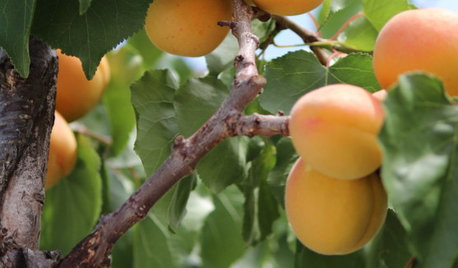

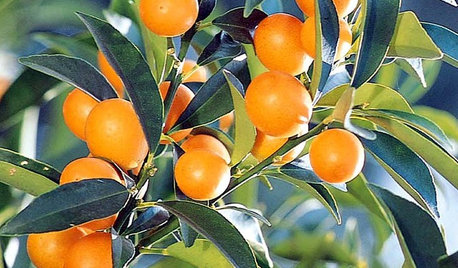
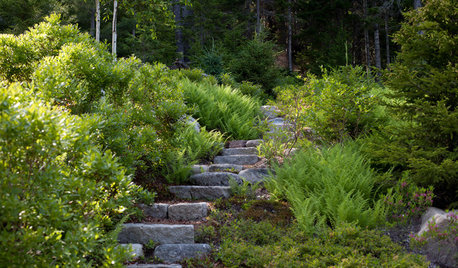




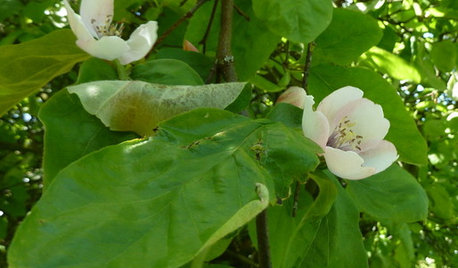






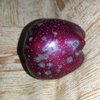
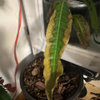
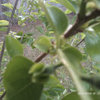
joereal